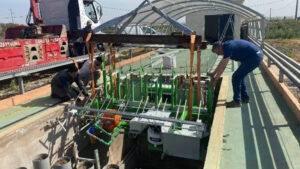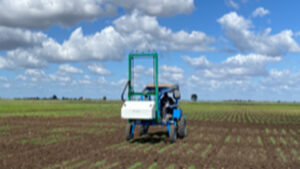

No Posts Found.
ICARDA’s Genetic Resources (GRS) team, led by Dr. Zakaria Kehel, works in Lebanon and Morocco alongside global networks including the CGIAR Genebank Platform, the Global Crop Diversity Trust, the German Agency for International Cooperation (GIZ), the European Union (EU), and other development partners.
Together, they collect, conserve, and develop the vital genetic resources needed to protect agrobiodiversity in dry regions. ICARDA’s GRS team has started translating its standard operating procedures into Arabic and French for dissemination across Central and West Asia and North Africa.
Significant 2021 developments in our work on genetic resources were:
As of September 2021, ICARDA’s genebanks contain 151,889 accessions of cereals, food legumes, forage, and rangeland species. Some 15,926 and 5,557 accessions were regenerated in Morocco and Lebanon, respectively. In addition, a total of 17,896 accessions for import, 35,251 accessions for export, and 21,759 accessions for conservation were analyzed for seed health.
In 2021, the GRS team started the regeneration of non-Svalbard safety duplication with over 6,000 chickpea accessions retrieved from the International Crops Research Institute for the Semi-Arid Tropics. Additionally, ICARDA-Lebanon has successfully regenerated around 1,000 wild relatives sent by the Millennium Seed Bank in the United Kingdom.
The Focused Identification of Germplasm Strategy (FIGS) methodology is a scientifically-proven tool that helps crop breeding programs identify valuable traits in plant genetics more accurately and efficiently, improving on the limitations of more traditional approaches. To scale the FIGS methodology, ICARDA launched an open-source FIGS analytical tool for broader use and developed a Genesys sub-setting tool with the International Center for Tropical Agriculture (CIAT). ICARDA further collaborated with CIAT to create a dashboard to summarize outputs from a gap analysis of 22 CGIAR crops. This collection mission planning tool can be used by genebanks from both CGIAR and national programs.
2021 witnessed the regeneration of lines from the first successful interspecific crosses between grass pea and five Lathyrus species. This resulted in a total of 110 F3 families from interspecific crosses using Lathyrus cicera. F2 and F3 BC2 and BC3 seeds from crosses with L. articulatus, L. cicera, L. heirosolymitanus, L. inconspicuous, L. marmoratus, and L. ochrus were also successfully produced. Additionally, new interspecific crosses were performed for barley and wheat to target disease and insect resistance and the production of micronutrients and beta-glucans.
In 2021, ICARDA, with the support and collaboration of the CGIAR WHEAT Research Program and co-investing national agricultural research institutes, the International Maize and Wheat Improvement Center (CIMMYT), and the Institut National de la Recherche Agronomique (INRA-Morocco), developed the innovative PhysioTron, a machine that speeds up the accurate measuring and recording of plant genetic traits, allowing for more advanced research toward achieving food security in the dry areas. The PhysioTron can house up to 750 plots, each 1.5 meters deep and filled with soil according to soil profiles specified by the station. Its fully automated control system offers flexibility for designing a wide range of experiments that allow for the application of various and controlled water regimes in each plot. A mobile gantry also enables researchers access to middle plots without disturbing the earth of side plots.

Further innovation relates to the field-based high-throughput phenotyping (HTP) system, as phenotyping remains one of the main bottlenecks in plant breeding. In response, with the support of the Arab Fund for Economic and Social Development (AEFSD), Dr. Andrea Visioni and the manufacturer Hiphen developed the PhenoBuggy: a tractor-mounted, GPS-assisted multi-sensor head. The PhenoBuggy allows for rapid and accurate measuring of phenotypic traits, such as green fraction, senescence, vegetation indices, leaf area index, biomass, spike number, and plant height.

ICARDA continued its contributions to the EU-funded Activated Genebank Network (AGENT) project, launched in 2020 to transform genebanks from passive seed libraries into advanced bio-informatics resource centers. In 2021, ICARDA scientists helped devise more straightforward tools and procedures for genomic work that would typically involve a lot of complex statistics to improve breeders’ ability to define valuable germplasm. Through AGENT, ICARDA and partners are working to collect and standardize phenotype information from global genebank networks within a single database. This will revolutionize plant genetic resources and information sharing.
New lines of all our wheat crops aligned to product lines can be found in ICARDA’s International Nurseries.
ICARDA’s Farming with Alternative Pollinators (FAP), led by. Dr. Stefanie Christmann and funded by the German Federal Ministry for the Environment, Nature Conservation and Nuclear Safety, enhances agricultural land by marketable habitat enhancement plants (MHEP), nesting and water support. MHEP prolong the flowering times in the fields and attract higher diversity and abdundance of pollinator (enhancing productivity of many crops) and natural enemies (reducing pest abundance in the main crop and the need for chemicals). Both effects increase the net income gain to farmers significantly and substantially. A project in Morocco in four agro-ecosystems, with seven different main crops and more than 230 smallholder fields showed net income increase of 121% and a reduction of pest abundance in the main crop by 65%.